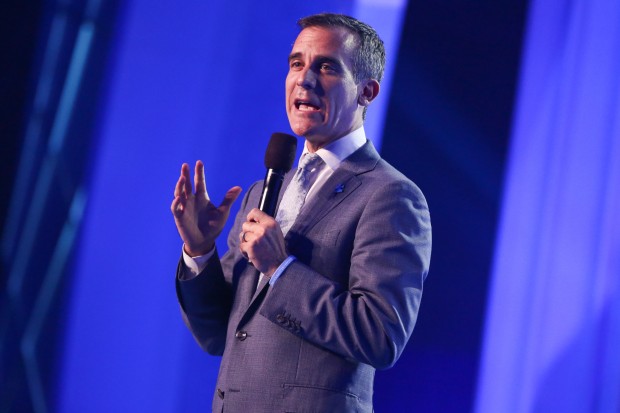WASHINGTON — It’s hard to miss Los Angeles Mayor Eric Garcetti in the crowd of conference delegates.
He seems to be everywhere — meeting the constituents, pressing the flesh, oozing the charm in the lobby, hallways and bars of a Washington hotel. There he is at a reception in downtown Washington, exchanging pleasantries and business cards with everyone around him.
This is no ordinary political campaign, though. It’s the real launch of Garcetti’s quest to bring the Olympics to Los Angeles in 2024.
Garcetti and Los Angeles bid chairman Casey Wasserman have been in the thick of the action during a gathering of the Association of National Olympic Committees, a conference which has brought more than 1,200 delegates from 200-plus countries to the nation’s capital.
“The nice thing about this place, the guy from St. Lucia is just as important as the guy from China,” Garcetti said in an interview with The Associated Press on Wednesday.
The ANOC general assembly, which formally opens Thursday, is the first global event where the five cities vying for the 2024 Games are together in one place and can meet key players of the Olympic world.
“It’s a process,” Wasserman said. “It’s important to establish names to faces. It’s a first step in a long journey to build relationships, and so first impressions are important.”
Los Angeles is competing against four European cities — Rome, Paris, Hamburg and Budapest. The California city and Paris are seen as the early front-runners in a two-year campaign that will culminate with an IOC vote in September 2017.
Each bid city has six accredited delegates for the ANOC meeting. While IOC rules prevent them from making formal presentations or conducting major promotional activities here, this is a crucial time for bid leaders to connect with IOC members, national Olympic committee officials and sports federation leaders.
Garcetti opts for the soft approach, not the hard sell.
“We have to be very careful,” he said, leaning back in a chair during a break from his non-stop networking. “I’m not pushing anything. It’s more like, ‘Hi, I’m the mayor of Los Angeles. This is Casey Wasserman, successful businessman in the world of sports.’ We’re greeting them and letting them know that America and Americans love the Olympics.”
Los Angeles, which hosted the 1932 and 1984 Olympics, is seeking to bring the Summer Games back to the U.S. for the first time since Atlanta hosted the 1996 Games. The U.S. is trying to work its way back fully into the global Olympic fold after New York was rejected for the 2012 Games and Chicago for 2016.
As the youthful face of the bid, the 44-year-old Garcetti has been on the go, chatting with IOC President Thomas Bach, talking to a Malaysian prince in the hotel bar past midnight, popping out to lunch with IOC vice president John Coates and Israeli member Alex Gilady.
“The feedback has been great,” Garcetti said. “I think there’s a real depth of warmth for Los Angeles and excitement that we’re one of the bid cities. I’m also struck by how familial the environment is. It really is like a class from school, 100 people all scattered around. But they all know each other. They know each other’s drinks and favorite cigars.”
Garcetti, who has family roots in Italy and Mexico and speaks fluent Spanish, studied as a Rhodes Scholar at Oxford and has lived on four continents. His international background works well in Olympic circles.
“They are sort of surprised I can say sentences in Japanese and can listen to the Algerian guy speak French,” he said.
Garcetti is used to campaigning for votes. But this election involves 100-plus IOC members from dozens of countries who vote by secret ballot and often for individual reasons.
“It’s relationship-based,” the mayor said. ” Like any campaign it’s about building trust and listening.”
That trust has been missing in the past, and contributed to the failure of the New York and Chicago bids. But the dynamics have changed since the IOC and USOC resolved their revenue-sharing dispute. The USOC has acknowledged it needs to be more closely engaged with the rest of the Olympic world, a point underlined by USOC chairman Larry Probst in a reception speech Wednesday night.
“People want us to be assertive and brave about the Olympic movement but not to tip over to being arrogant,” Garcetti said. “It’s like, ‘Win it on your merits, be a good team player. We already know how big you are, how many athletes and medals you have. Just be one of us.'”
Despite his frenetic pace this week, Garcetti said there’s a limit to the lobbying.
“I don’t want to show up 18 times in people’s faces,” he said. “You don’t want to be the annoying person at the party.”
